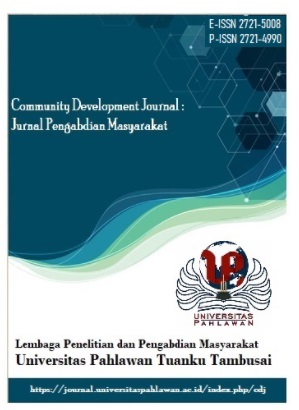KONTROL DIRI SEBAGAI MEDIATOR KONSEP DIRI, RESILIENSI, DUKUNGAN SOSIAL TERHADAP HASIL BELAJAR SISWA
DOI:
https://doi.org/10.31004/jrpp.v5i1.5706Keywords:
Kontrol Diri, Resiliensi, Hasil BelajarAbstract
Kontrol Diri diartikan sebagai kemampuan seseorang untuk mengontrol perilakunya; baik mengendalikan keinginan, menunda kepuasan diri, mengatur emosi, mengikuti tata aturan, dan kemampuan memulai atau menghentikan perilaku secara spesifik. Kontrol diri berhubungan dengan hasil belajar siswa di sekolah. Siswa dengan kontrol diri yang lebih tinggi memiliki nilai yang lebih baik karena membuat pilihan-pilihan yang lebih tepat antara belajar dan kegiatan lainnya, menggunakan waktu belajar dengan bijak, dan menjaga kondisi emosionalnya. Kontrol diri berkaitan dengan konsep diri, relisiensi dan dukungan sosial. Pengaruh konsep diri terhadap kontrol diri adalah berkorelasi signifikan terhadap pengelolaan dan kontrol diri remaja apabila siswa dengan konsep diri akademik yang tinggi diharapkan akan lebih yakin pada kualitas akademik yang dimilikinya dan begitu juga sebaliknya. Selain itu kontrol diri juga memiliki pengaruh positif dan signifikan terhadap resiliensi, karena resiliensi merupakan konstruk ekologi, dimana lingkungan siswa (orang tua, guru, rekan-rekan dan kelompok sosial lainnya) memegang peranan cukup besar untuk menjadikan siswa menjadi resiliensi atau tidak. Kontrol diri juga memiliki pengaruh terhadap dukungan sosial, karena dukungan sosial merupakan unsur yang dapat membantu siswa untuk menghadapi situasi yang sulit. Jadi dengan adanya kontrol diri yang baik, maka konsep diri, resiliensi dan dukungan sosial juga akan berkorelasi baik pula, begitu juga hasil belajar akan menjadi baik pula.References
Bong, M., & Skaalvik, E. M. (2003). Academic self-concept and self-efficacy: How different are they really? Educational Psychology Review, 15(1), 1–40. https://doi.org/10.1023/A:1021302408382
Dennis, J. M., Phinney, J. S., & Lizette Ivy Chuateco. (2015). The Role of Motivation, Parental Support, and Peer Support in the Academic Success of Ethnic Minority First-Generation College Students. Journal of College Student Development, 46(3), 223–236. https://doi.org/10.1353/csd.2005.0023
Dewanti, & Veronika. (2014). Resiliensi Remaja Putri terhadap Problematika Pasca Orang Tua Bercerai. Jurnal Psikologi Pendidikan Dan Perkembangan, 3(3), 164–171.
Diri, P. E., & Dan, K. B. (2015). Pengaruh efikasi diri, aktivitas, kemandirian belajar dan kemampuan berpikir logis terhadap hasil belajar matematika pada siswa kelas viii smp. Journal of EST, 1 No 2(September), 86–101.
Duckworth, A. L., Gendler, T. S., & Gross, J. J. (2014). Self-Control in School-Age Children. Educational Psychologist, 49(3), 199–217. https://doi.org/10.1080/00461520.2014.926225
Goel, K. S., Amatya, K., Jones, R. T., & Ollendick, T. H. (2014). Child and Adolescent Resiliency Following a Residential Fire: The Role of Social Support and Ethnicity. Journal of Child and Family Studies, 23(3), 537–547. https://doi.org/10.1007/s10826-013-9715-4
Goldsmith, D. J. (2004). Introduction Social Support. In D. J. Goldsmith (Ed.), Communicating Social Support (pp. 1–10). Cambridge University Press.
Hardy, G. (2014). Academic Self-Concept: Modeling and Measuring for Science. Research in Science Education, 44(4), 549–579. https://doi.org/10.1007/s11165-013-9393-7
Honken, N. B., & Ralston, P. A. S. (2015). High-Achieving High School Students and Not So High- Achieving College Students: A Look at Lack of Self- Control, Academic Ability, and Performance in College. Journal of Advanced Academics, 24(2), 108–124. https://doi.org/10.1177/1932202X13482466
Karlin, N. J., Marrow, S., Weil, J., Baum, S., & Spencer, T. S. (2012). Social Support, Mood, and Resiliency Following a Peruvian Natural Disaster. Journal of Loss & Trauma, 17(5), 470–488. https://doi.org/10.1080/15325024.2012.665019
Kirchner, E. E., & Higgins, G. E. (2014). Self-Control and Racial Disparities in Delinquency: A Structural Equation Modeling Approach. American Journal of Criminal Justice, 39(3), 436–449. https://doi.org/10.1007/s12103-013-9205-7
Kuhl, J., & Arno Fuhrmann. (1998). Decomposing Self-Regulation and Self-Control: The Volitional Components Inventory. In H. Jutta & C. S. Dweck (Eds.), Motivation and Self-Regulation Across the Life Span (pp. 1–15). Cambridge University Press. https://doi.org/10.1017/cbo9780511527869.015
Lindsay, G., & Dockrell, J. (2012). Longitudinal Patterns of Behavioral, Emotional, and Social Difficulties and Self-Concepts in Adolescents with a History of SLI. Language, Speech, and Hearing Services in Schools, 43(October), 445–460. https://doi.org/10.1044/0161-1461(2012/11-0069)1996
Mappeasse, M. Y. (2010). Pengaruh Cara Dan Motivasi Belajar Terhadap Hasil Belajar Programmable Logic Controller (PLC) Siswa Kelas Iii Jurusan Listrik Smk Negeri 5 Makassar. 1(2), 1–6.
Marsh, H. W., & Martin, A. J. (2011). Academic self-concept and academic achievement: relations and causal ordering. The British Journal of Educational Psychology, 81(Pt 1), 59–77. https://doi.org/10.1348/000709910X503501
Mears, D. P., Cochran, J. C., & Beaver, K. M. (2013). Self-Control Theory and Nonlinear Effects on Offending. Journal of Quantitative Criminology, 29(3), 447–476. https://doi.org/10.1007/s10940-012-9187-5
Mendikbud RI. (2016). Pidato Menteri Pendidikan dan Kebudayaan RI Pada Hari Pendidikan Nasional, 2 Mei 2016. Kementerian Pendidikan dan Kebudayaan Republik Indonesia.
Meshkat, M., & Hosseini, S. M. (2015). The Relationship Between Academic Self-Concept and Learning English in High School Student. Modern Journal of Language Teaching Methods (MJLTM), 4(5), 383–389.
Ommundsen, Y., Haugen, R., & Lund, T. (2005). Academic Self-concept, Implicit Theories of Ability, and Self-regulation Strategies. Scandinavian Journal of Educational Research, 49(5), 461–474. https://doi.org/10.1080/00313830500267838
Piquero, A. R., MacIntosh, R., & Hickman, M. (2000). Does Self-Control Affect Survey REsponse? Criminology, 38(3), 897–930.
Rose, J., & Steen, S. (2014). Fostering resiliency in middle school students. Professional School Counseling, 18(1), 28–38.
Saleh, F. M., Malin, H. M., Grudzinskas, A. J., & Vitacco, M. J. (2007). Paraphilias with co-morbid psychopathy: The clinical and legal significance to sex offender assessments. Behavioral Sciences & the Law, 28(2), 211–223. https://doi.org/10.1002/bsl
Sodian, B., & Frith, U. (2008). Metacognition, theory of mind, and self-control: The relevance of high-level cognitive processes in development, neuroscience, and education. Mind, Brain, and Education, 2(3), 111–113. https://doi.org/10.1111/j.1751-228X.2008.00040.x
Sugiyono, M. P. P., & Kuantitatif, P. (2009). Kualitatif, dan R&D, Bandung: Alfabeta. Cet. Vii.
Walter, O., & Sat, E. (2013). Dance and its influence on emotional self-control and regulation and emotional intelligence abilities among early childhood-aged children. International Journal of Arts and Sciences, 6(4), 77–97.
Widayanti, L. (2013). Problem Based Learning pada Siswa Kelas VIIA MTs Negeri Donomulyo Kulon Progo Tahun Pelajaran 2012 / 2013. XVII(April), 32–35.
Downloads
Published
Versions
- 2022-07-27 (2)
- 2022-06-30 (1)
How to Cite
Issue
Section
License
Copyright (c) 2022 Miskanik

This work is licensed under a Creative Commons Attribution-ShareAlike 4.0 International License.







